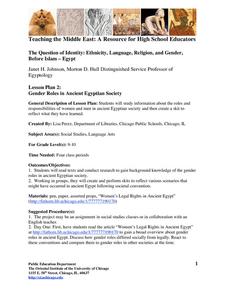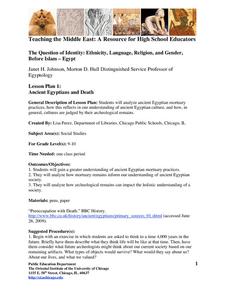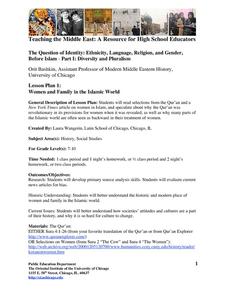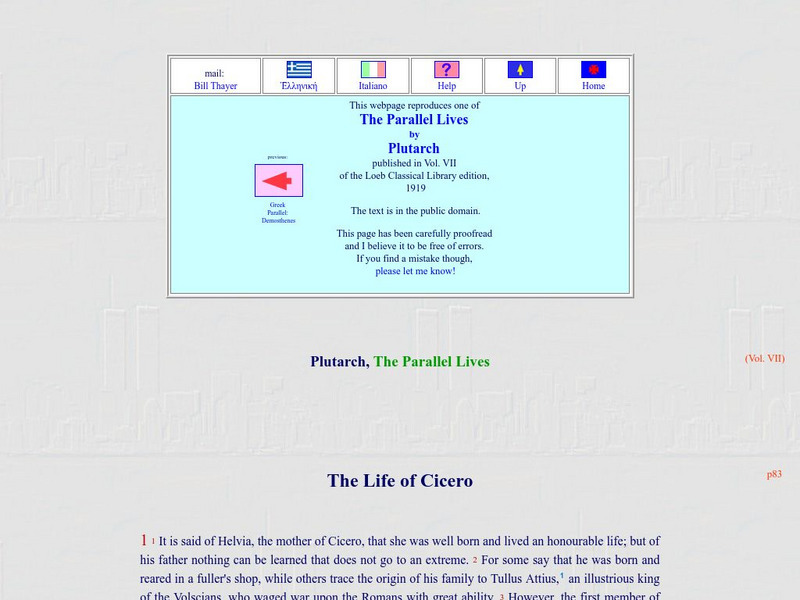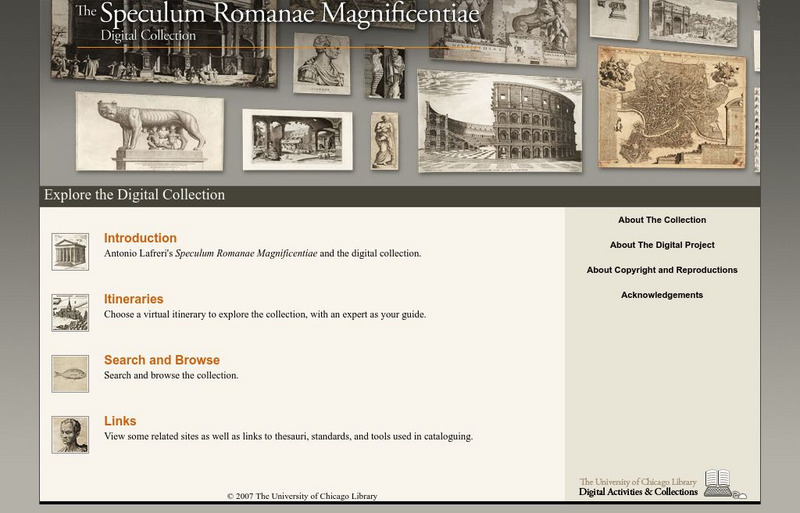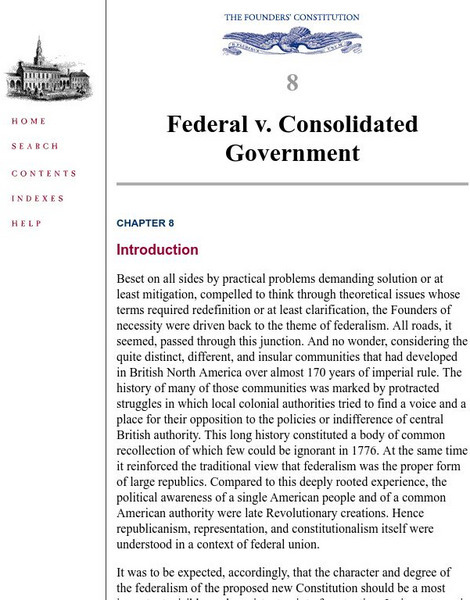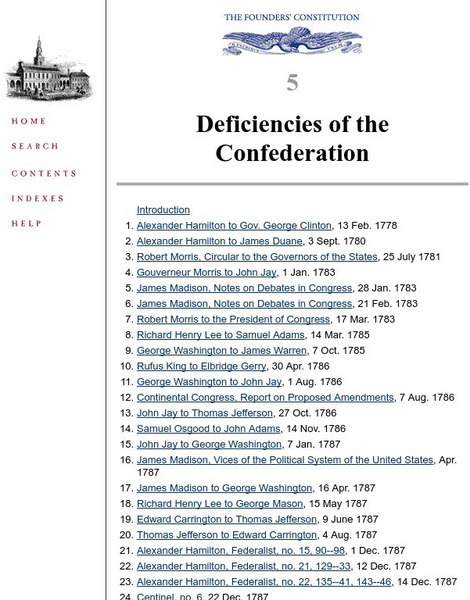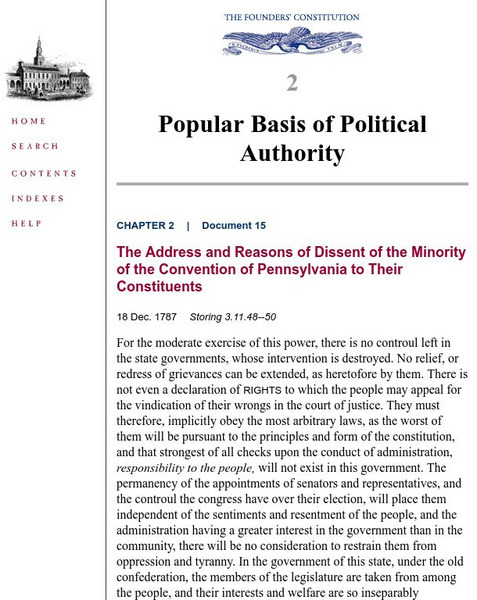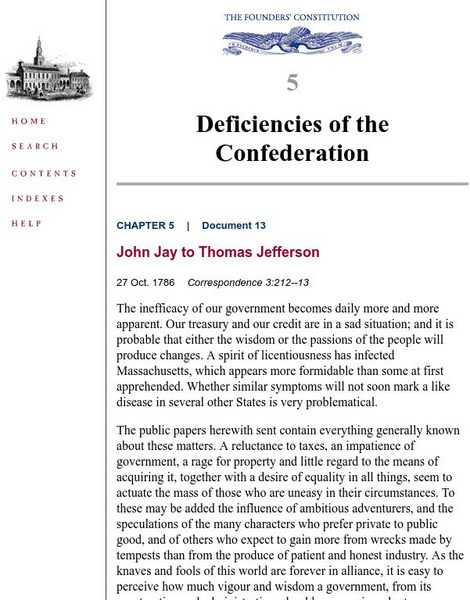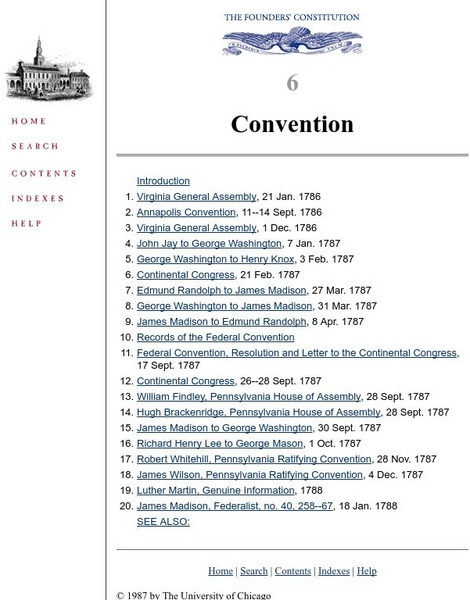University of Chicago
Don't Be Too Flaky
Snow, ice, and water are all composed of H2O. Does that mean they all have the same volume? Discover the ways that the densities of these substances determine their volumes, and how they change based on their current states of matter....
University of Chicago
Gender Roles in Ancient Egyptian Society
After reading about the legal status of women in the Old Kingdom of ancient Egypt and doing some additional research, your young historians will work in groups to develop short skits that reflect a typical gender-role related scenario...
University of Chicago
What IS the Difference Between Sunni and Shi'ite Muslims?
The distinction between Shiite and Sunni Muslims is an often misunderstood concept, yet very important for its implications in global affairs and for a more comprehensive understanding of the religion of Islam.
University of Chicago
Exercise in Conflict Resolution
How do major religions, including Judaism, Christianity, and Islam, differ in how they view the role of individual freedoms within society, the definition of morality, and the importance of politically satisfying the greater good? Here...
University of Chicago
Comparing Modern and Ancient Ideas of Ethnicity and Identity
Explore ethnicity and identity with a research and writing assignment. Class members conduct online research, looking in particular at images and carefully noting down their sources on notecards. They read about identity and compose...
University of Chicago
Using Artifacts for Clues About Identity
Learn about the ancient Near East through a close examination of ancient artifacts. Lead your class into analysis by first observing an artifact as a class. Pupils can then work in pairs to analyze the other artifacts and compile a list...
University of Chicago
Ancient Egyptians and Death
What archaeological evidence remains of ancient Egyptian burial and mortuary practices, and what can this information tell us about ancient Egyptian society?
University of Chicago
Women and Family in the Islamic World
How does the Qur'an detail the role of women? What modern social issues are linked to Islamic law? Address these questions with your young historians through close analysis of primary and secondary source documents.
University of Chicago
Addressing Stereotypes
How is a stereotype defined, and what are some mechanisms we can use to combat negative stereotyping? Your young historians will discuss how and why stereotyping occurs, as well as consider the roots of modern conceptions of the Middle...
University of Chicago
Plutarch: The Parallel Lives: The Life of Cicero
An English translation of The Life of Cicero, by Roman biographer, Plutarch. Text is from the Loeb Classical Library, 1919 edition, and is in the public domain.
University of Chicago
University of Chicago: Speculum Romanae Magnificentiae
Printed images of the major architectural monuments and sculptures of ancient Rome spread knowledge of classical antiquity throughout Europe. The "Speculum Romanae Magnificentiae" (the "Mirror of Roman Magnificence") represents a...
University of Chicago
History of New Orleans: The Battle of New Orleans
This is a chapter from the John Kendall book the "History of New Orleans" that looks at the Battle of New Orleans, one of the last combats between the British and Americans during the War of 1812. It is advanced in content and style,...
University of Chicago
The Founders' Constitution: Joseph Story: Commentaries on the Constitution
This page is a series of writings by Joseph Story on the jurisdiction, both original and appellate, assigned to the Supreme Court by the Founding Fathers. Published in 1833.
University of Chicago
The Founders' Constitution: Federal v. Consolidated Government
This chapter introduction describes the historical context in which the issue of federalism was discussed by our nation's Founders. Discusses the Federalist and Anti-Federalist points-of-view.
University of Chicago
The Founders' Constitution: Letter From George Mason to T. Jefferson
This letter from George Mason shows his Anti-Federalist opinions and opposition to a planned centralized government.
University of Chicago
The Founders' Constitution: Deficiencies of the Articles of Confederation
Primary source documents (letters) concerning the need for a central government written by Madison, Hamilton, Jay, and others.
University of Chicago
Telescopes at Yerkes Observatory / Virtual Tour
This site describes the difference between reflective and refractive telescopes and includes a virtual tour of Yerkes Observatory which houses the largest refracting telescope in the world.
University of Chicago
The Founders' Constitution: Popular Basis of Political Authority
This speech, "The Address and Reasons of Dissent of the Minority of the Convention of Pennsylvania to Their Constituents," contains some of the arguments for opposing the Constitution.
University of Chicago
The Founders' Constitution: Popular Basis of Political Authority
Read the words of John Adams at the Constitutional Convention where he is debating the meaning of "the people" in the Constitution.
University of Chicago
The Founders' Constitution: Deficiencies of the Confederation
University of Chicago Press provides a letter from John Jay to Thomas Jefferson in which Jay explains the need to reform the government existing under the Articles of Confederation.
University of Chicago
The Founders' Constitution: Deficiencies of the Confederation
The University of Chicago provides a letter from Richard Henry Lee to George Mason in which Lee describes the financial problems the Confederation has run into and suggests minor reforms be made.
University of Chicago
The Founders' Constitution: Constitutional Convention
A list of links to texts of original documents written by participants in the Constitutional Conventions, relating to their attempts to create an acceptable national constitution. Organized in chronological order.
University of Chicago
The Founders' Constitution: Federal v. Consolidated Government: Virginia Plan
The original text of The Virginia Plan presented at the Constitutional Convention. Discusses federal versus consolidated government.
University of Chicago
The Founders' Constitution: Jefferson's First Inaugural Address
With this address, Jefferson marked the first-ever peaceful transfer of power by election in the world. He used this address to calm the fears of the opposition Federalist party.



